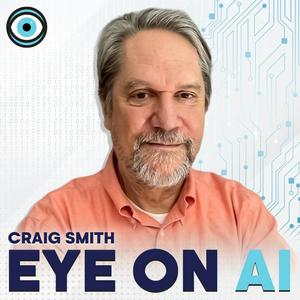#245 Rajat Taneja: Visa's President of Technology Reveals Their $3.3 Billion AI Strategy
This episode is sponsored by Thuma. Thuma is a modern design company that specializes in timeless home essentials that are mindfully made with premium materials and intentional details. To get $100 towards your first bed purchase, go to http://thuma.co/eyeonai Visa’s President of Technology, Rajat Taneja, pulls back the curtain on the $3.3 billion AI transformation powering one of the world’s most trusted financial networks. In this episode, Taneja shares how Visa—a company processing over $16 trillion annually across 300 billion real-time transactions—is leveraging AI not just to stop fraud, but to redefine the future of commerce. From deep neural networks trained on decades of transaction data to generative AI tools powering next-gen agentic systems, Visa has quietly been an AI-first company since the 1990s. Now, with 500+ petabytes of data and 2,900 open APIs, it’s preparing for a future where agents, biometrics, and behavioral signals shape every interaction. Taneja also reveals how Visa’s models can mimic bank decisions in milliseconds, stop enumeration attacks, and even detect fraud based on how you type. This is AI at global scale—with zero room for error. What You’ll Learn in This Episode: How Visa’s $3.3B data platform powers 24/7 AI-driven decisioning The fraud models behind stopping $40 billion in criminal transactions What “agentic commerce” means—and why Visa is betting big on it How Visa uses behavioral biometrics to detect account takeovers Why Visa rebuilt its infrastructure for the AI era—10 years ahead of the curve The role of generative AI, biometric identity, and APIs in the next wave of payments The future of commerce isn’t just cashless—it’s intelligent, autonomous, and trust-driven. If you’re curious about how AI is redefining payments, security, and digital identity at massive scale, this episode is essential viewing. Subscribe for more deep dives into the future of AI, commerce, and innovation. Stay Updated: Craig Smith on X:https://x.com/craigss Eye on A.I. on X: https://x.com/EyeOn_AI (00:00) Introduction (02:57) Meet Rajat Taneja, Visa’s President of Technology (04:02) Scaling AI for 300 Billion Transactions Annually (05:27) The Models Behind Visa’s Fraud Detection (08:02) Visa’s In-House AI Models vs Open-Source Tools (10:54) Inside Visa’s $3.3B AI Data Platform (12:29) Visa’s Role in E-Commerce Innovation (16:24) Biometrics, Identity & Tokenization at Visa (21:14) Visa’s Vision for AI-Driven Commerce
